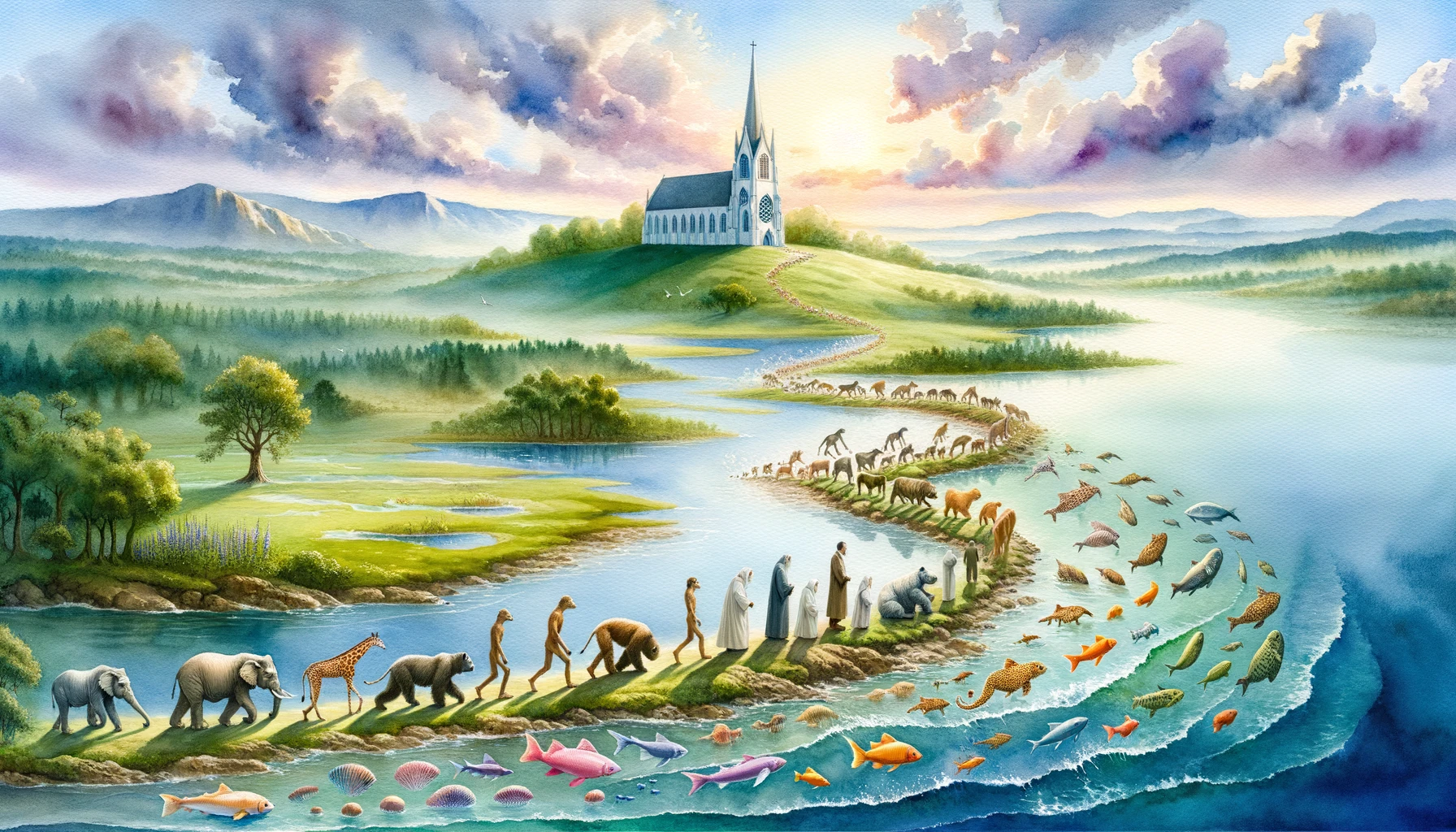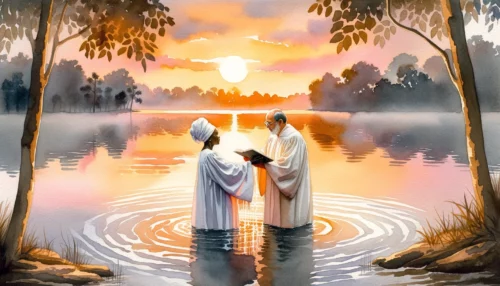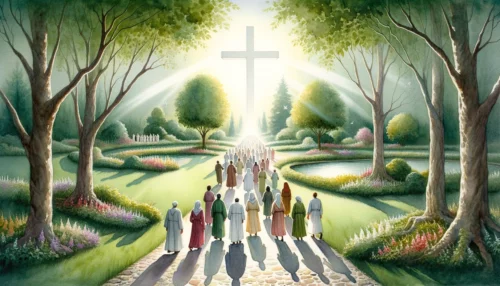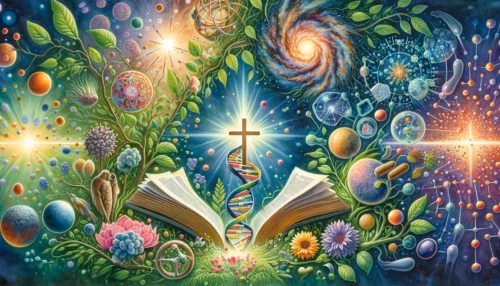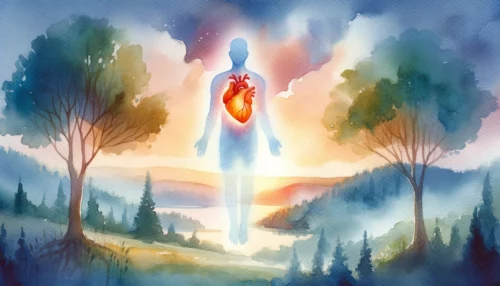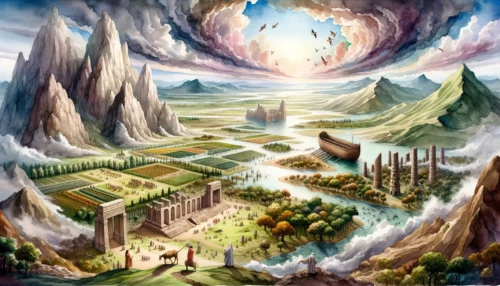As we venture into the depths of this discussion, we will aim to harmoniously blend our faith with the advances of modern science, and strive to unravel the seeming contradictions. The Bible, being our primary source of faith and guidance, has profound insights on the origin of life and the universe. Yet, evolution as a scientific theory brings its own insights, raising questions that compel us to revisit and rethink our understanding. Let us engage in this journey of exploration, keeping an open mind, but always rooted in the word of God.
The Genesis Account: Understanding Creation in the Bible
The first two chapters of Genesis provide an account of the world’s creation. It all starts with God creating the heavens and the earth, the land, and the seas (Genesis 1:1-10). Then, God brings forth all sorts of vegetation – plants yielding seed, and trees bearing fruit with seed in it, according to their various kinds (Genesis 1:11-12).
After establishing the earth, God turns His attention to the skies. He creates the sun, moon, and stars to serve as lights and to separate day from night, and to mark seasons, days, and years (Genesis 1:14-19).
Following this, life begins to stir. God creates all forms of life in the water and birds in the sky on the fifth day (Genesis 1:20-23). On the sixth day, God creates animals that live on the land, each according to its kind (Genesis 1:24-25).
But the pinnacle of God’s creation, according to Genesis, is humankind. God creates man and woman in His own image (Genesis 1:26-27), blessing them and giving them dominion over every other living creature (Genesis 1:28-30).
Once all of this is complete, God rests on the seventh day, sanctifying it as a day of rest (Genesis 2:1-3).
In Genesis chapter 2, we get a more detailed account of the creation of the first man and woman. God forms man from the dust of the ground and breathes into his nostrils the breath of life, causing him to become a living being (Genesis 2:7). Woman is created from one of man’s ribs, showing that she is of the same substance as man (Genesis 2:21-22).
This Genesis account of creation sets the stage for the biblical narrative. It establishes that all of existence, all of life, and all of humanity, originate from the intentional, creative act of God.
Understanding this account is vital as it forms the foundation of Christian belief about our origins and purpose. It underlines our intrinsic value as beings created in God’s image, and our role as stewards of the earth. However, that the Bible’s purpose isn’t to provide a scientific account of creation, but rather a theological one. It teaches us who created the universe and why, rather than detailing how in a scientific sense.
Evolution: A Brief Overview and its Compatibility with Christian Belief
Charles Darwin, a 19th-century biologist, is credited with developing the evolution theory, though many others have contributed to it over time. In essence, the theory of evolution posits that all species of organisms arise and develop through the natural selection of small, inherited variations that increase the individual’s ability to compete, survive, and reproduce.
Darwin’s concept of evolution is often summarized by the phrase “survival of the fittest,” which encapsulates the idea of natural selection. This suggests that in any given environment, the individuals best suited to that environment are more likely to survive and reproduce, passing on their advantageous traits to their offspring. Over countless generations, these small changes accumulate, leading to the emergence of new species and the extinction of others.
For some, the theory of evolution appears to conflict with the creation story in Genesis. However, many Christians have found ways to reconcile their faith with the findings of modern science. They argue that the Bible’s purpose is not to serve as a science textbook, but rather to convey spiritual truths about God, humanity, and the world.
In fact, the Bible itself suggests that God’s creative process involved processes and stages. The psalmist declares that God’s works are manifold and made in wisdom (Psalm 104:24), implying a complex and orderly process. In Proverbs 8:22-31, wisdom is portrayed as being present with God during creation, suggesting a process that is not random, but thoughtful and deliberate.
This can be interpreted to align with the scientific view of a universe that develops over time. Just as God uses natural processes like the water cycle and photosynthesis to sustain life, it is possible that He used evolution as a tool in His creative process.
Many Christians view evolution not as a replacement for God’s creative act, but as a means by which God could have brought about the diversity of life we see today. They see no contradiction between the idea of a Creator God and the theory of evolution. God, in His infinite wisdom and power, could certainly work through evolutionary processes to create the diversity of life we see today.
We’ve outlined the theory of evolution and explored how it might be compatible with Christian belief. Understanding evolution as a potential tool used by God in His creative process allows us to harmonize the insights of modern science with our faith in the Creator.
Bridging the Gap: Harmonizing Biblical Creation and Evolution
Let’s continue our journey by trying to bridge the gap between the biblical account of creation and the theory of evolution. We’ll explore how these two perspectives can coexist harmoniously within the Christian faith.
God is revealed in Scripture as the Creator of all things, giving order and purpose to the universe. The biblical account of creation focuses on the who and the why, not necessarily the how. It emphasizes God as the origin of life and highlights our responsibility as stewards of His creation.
The theory of evolution, on the other hand, is a scientific explanation of the natural world’s complexity and diversity. It is concerned with the process – the how – and doesn’t seek to answer questions of why the universe exists or who initiated the process.
Some Christian believers find no conflict between these perspectives, adopting a view known as theistic evolution or evolutionary creationism. This perspective holds that God is the source of all life and that evolution is the process by which He created biological diversity. The order and regularity observed in natural processes, including evolution, reflect God’s nature and His orderly, purposeful plan for creation.
One key point to remember is the genre and purpose of the biblical creation account. The Genesis narrative, rich with symbolism and metaphor, was written to convey theological truths to an ancient audience, not to provide a detailed scientific explanation by modern standards. The days of creation, for example, can be understood metaphorically, symbolizing God’s structured and orderly act of creation, rather than literal 24-hour periods (Genesis 1).
The apostle Paul in Romans 1:20 emphasizes that God’s eternal power and divine nature are clearly seen in creation, implying that the natural world can reveal truths about the Creator. This suggests that scientific exploration, including the study of evolution, can lead us to a deeper appreciation of God’s wisdom and creativity.
The biblical account of creation and the theory of evolution can be harmonized within a Christian worldview. The key is to recognize the different questions that the Bible and science seek to answer. The Bible addresses the who and the why of creation, while science investigates the how. When understood in this way, there is room for Christians to appreciate and embrace the insights provided by both the Bible and modern science, while maintaining a deep and abiding faith in God as the Creator of all things.
Journeying Towards Deeper Insight
Navigating the perceived divide between the biblical account of creation and the scientific theory of evolution can seem daunting. Yet, it is a journey that can lead to a deeper understanding and appreciation of God’s creation. It invites us to marvel at the complexity of the universe and the diversity of life, seeing in them the handiwork of a loving, creative, and purposeful God.
As we continue this journey of discovery and understanding, we invite you to consider the following:
- How does the understanding of evolution as a potential tool in God’s creative process affect your view of God as Creator?
- What insights about God’s nature and His relationship with creation can be gained from exploring the connections between faith and science?
- How can the integration of faith and science deepen your appreciation of the biblical account of creation?
Our faith is not threatened by scientific discovery, but rather enriched by it. As we seek to understand more about our world and our place in it, we draw closer to the One who set it all in motion. The cosmos, in all its grandeur and intricacy, points us towards the Creator, inviting us to know Him more deeply and to stand in awe of His boundless creativity.




